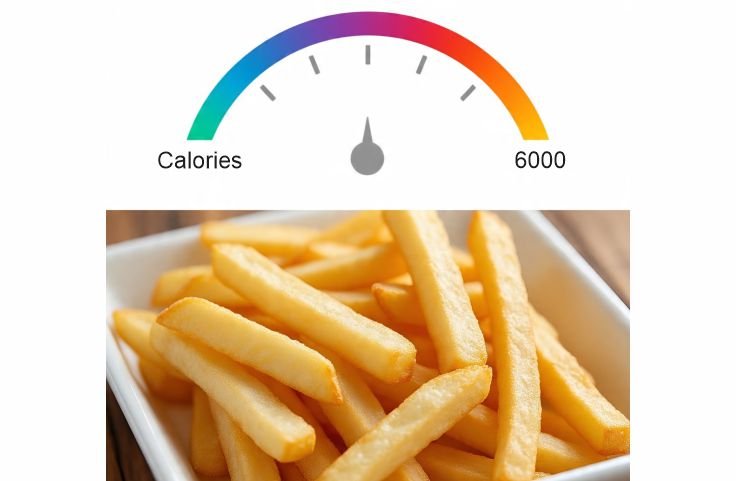Yuca fries nutrition isn’t what you think; crunchy, golden, and guilt-worthy, or secretly wholesome? Let’s break the myth and reveal what your body gets with every crispy bite.
Yuca fries, also called cassava fries, are dense in carbohydrates, higher in calories than regular potato fries, and packed with fiber, vitamin C, folate, and manganese.
If you’re watching your nutrition or looking for gluten-free side options, understanding what yuca fries offer is key.
They deliver slow-digesting starch, which provides energy and supports digestive health when eaten in moderation.
Unlike potato fries, yuca fries contain slightly more fiber and less sugar, which can help with satiety.
However, their high calorie content, especially when deep-fried, can quickly add up.
Portion size and preparation method matter. Baked or air-fried versions reduce the fat load, making them a more balanced option.
This article breaks down yuca fries’ nutritional profile, so you can decide when and how to include them in your meals without second-guessing their health impact.
See the general nutritional information of cassava.
Yuca Fries Nutrition Facts Breakdown
Yuca fries are more than just a potato swap. If you’re paying attention to calories, carbs, fiber, or micronutrients, here’s a clear look at what each serving brings to your plate.
Calories and Carbohydrates: Your Main Fuel
A 100-gram serving of yuca fries gives you around 160 calories, most of which come from its 38 grams of carbohydrates.
These carbs give you quick energy and keep you full longer than low-fiber snacks.
Yuca fries also have less sugar than potato fries, which may help reduce blood sugar spikes.
If you’re watching your intake or managing your energy levels, knowing how these carbs work can help you choose when to enjoy them.
Fiber Content: A Digestive Boost
Each serving contains about 1.8 grams of fiber. This may not seem like a lot, but it helps keep your digestive system active and supports regular bowel movements.
That added fiber also helps slow down digestion, making you feel full for longer.
If you’re trying to avoid mindless snacking or manage your weight, this natural fiber content works in your favor when eaten as part of a balanced meal.
Protein: Modest but Meaningful
You get around 1.4 grams of protein in a standard serving of yuca fries. While this isn’t a major protein source, it still adds up when paired with protein-rich foods.
If you’re on a plant-based or low-meat diet, every bit of protein matters.
Combine yuca fries with beans, fish, or lean meats, and you’ve got a more complete plate that supports your body’s repair and muscle function.
Fat: Naturally Low, Cooking Changes That
Raw yuca is naturally low in fat, offering just 0.3 grams per 100 grams.
But how you cook it matters. Deep frying can multiply the fat and calorie content fast, especially when using oil high in saturated fats.
For a lighter option, try baking or air-frying with a small amount of olive oil.
This keeps the flavor while helping you stay within your daily fat goals.
Vitamins and Minerals: Small Servings with Real Value
Yuca fries give you about 20 percent of your daily vitamin C needs, helping your immune system and skin health.
They also offer B vitamins like folate, which support energy use and cell function.
You’ll get minerals too: potassium to help your heart and muscles, magnesium for nerve health, and iron to support oxygen flow.
These nutrients add value to your plate, especially if you’re balancing comfort food with nutrition.
| Nutrient Category | What You Get from 100g of Yuca Fries |
|---|---|
| Calories and Carbohydrates | Around 160 calories and 38 grams of carbohydrates. These carbs provide quick energy and may support satiety. Yuca has less sugar than potatoes, which helps with better blood sugar control. |
| Fiber Content | About 1.8 grams of fiber. Supports digestion, promotes regularity, and helps you stay full longer. Helpful for weight management when paired with balanced meals. |
| Protein | Around 1.4 grams of plant-based protein. Not a high source but adds to your intake, especially when paired with protein-rich foods like beans or lean meats. |
| Fat | Naturally low in fat with only 0.3 grams per 100 grams. Frying increases fat and calorie count depending on oil type and quantity. Baking or air-frying keeps it lighter. |
| Vitamins and Minerals | Provides about 20% of your daily vitamin C, plus B vitamins like folate. Also contains potassium for heart health, magnesium for muscle function, and iron for oxygen transport. |
Related Posts
How to Make Cassava Fries with Air Fryer
How to Make Yuca Fries Dipping Sauce
Yuca Fries vs French Fries: The Ultimate Comparison
Calories in Yuca Fries: What to Expect

Yuca fries can range from light to calorie-dense depending on how you cook them.
Boiled yuca has about 330 calories per cup and retains its nutritional value without added fat.
Fried yuca fries, however, absorb oil during cooking and can reach 450 to 600 calories per serving, making portion control important.
A medium serving (150 to 200 grams) can account for nearly half of an adult’s daily calorie needs.
Baked yuca fries offer a lower-calorie alternative, typically containing 200 to 300 calories, depending on the oil used.
While healthier than frying, even baked fries can add up when paired with calorie-heavy dips like mayonnaise or ketchup.
Being mindful of how you prepare and serve yuca fries helps you enjoy them without overloading on calories.
It’s all about the balance between flavor, texture, and smart nutritional choices.
Are Yuca Fries Healthier Than Potato Fries?

Yuca fries and potato fries differ in carbs, fiber, and glycemic impact.
Yuca offers slightly more carbohydrates, about 38 grams per serving compared to 34 grams in potato fries, and provides more dietary fiber, which supports digestion and may help regulate blood sugar.
However, yuca has a higher glycemic index, which means it can raise blood sugar faster, making it less ideal for low-carb or diabetic diets.
While both can fit into a balanced diet, your choice should reflect your nutritional goals.
Want a deeper comparison? See our full post on yuca fries vs potato fries for a detailed breakdown of their nutritional differences, cooking methods, and which one works best for your health needs.
Health Benefits of Eating Yuca Fries in Moderation
Yuca fries can offer more than a satisfying crunch. When you keep portions in check, they give your body energy, fiber, and antioxidants that support daily health and well-being.
Steady Energy from Complex Carbohydrates
Yuca fries are rich in complex carbohydrates that release energy slowly.
If you stay active during the day or need lasting fuel, this kind of starch can help you feel steady and focused instead of drained.
It supports physical activity, boosts endurance, and keeps you from feeling sluggish between meals.
Unlike processed snacks, yuca’s natural carbs work better for long-lasting energy without quick crashes.
Supports Digestion and Keeps You Full
With a good amount of dietary fiber, yuca fries can support digestion by promoting regular bowel movements and helping to prevent constipation.
This fiber also helps you feel fuller longer, which may reduce the urge to snack unnecessarily.
If you’re managing your appetite or trying to build healthier eating habits, this natural fiber boost works in your favor, just be mindful of added oils when cooking.
Provides Antioxidants That Support Cell Health
Yuca contains vitamin C and polyphenols, both known for their antioxidant power.
These nutrients help protect your cells from everyday damage and may reduce inflammation in the body.
Vitamin C also supports skin repair and immune health.
To keep these antioxidants intact, bake or steam your yuca fries instead of deep-frying.
That way, you keep more of the good stuff and cut down on extra fat.
Fried Yuca Fries vs Baked Yuca Fries

How you prepare yuca fries makes a big difference in what you get from them. Fried yuca fries are usually cooked in vegetable or palm oil, which adds a high amount of fat and calories.
A 100-gram serving of fried yuca fries can reach up to 300 calories or more, with about 14 to 17 grams of fat, most of it from the oil.
This method also lowers some of the vitamin content due to high heat.
Baked yuca fries, on the other hand, use little to no added oil.
A similar serving may contain closer to 170 to 190 calories and less than 5 grams of fat, depending on how much oil is used for coating.
You still get the fiber, vitamin C, and minerals without the heavy calorie load, making baked fries a better option if you’re trying to eat lighter.
Health Drawbacks and Considerations
Yuca fries can fit into your diet, but there are a few things to keep in mind before making them a regular part of your meals.
Here’s what you should know.
High calorie load from oil absorption
When you deep fry yuca, it absorbs oil quickly. This can raise the calorie count to over 400 per serving, depending on how much oil you use.
If you’re not burning those extra calories through movement or daily activity, it may lead to weight gain over time.
Baking or air frying helps reduce the fat, but you still need to watch how much you eat.
Portion size plays a big role, especially if you’re trying to manage your weight or stay within a set calorie limit.
Too high in carbs for low-carb diets
If you’re following a keto or low-carb plan, yuca fries might not work for you.
One serving can have between 35 to 40 grams of carbs, which can throw you out of ketosis.
Even if you’re not strictly keto, that amount may be too much depending on your goals.
It’s always a good idea to check your daily carb intake and see where yuca fits in, especially if you’re limiting starches or watching blood sugar.
May spike blood sugar levels
Yuca has a high glycemic index, which means it can raise blood sugar quickly.
This makes it a tricky choice for people with diabetes or insulin resistance.
Eating large portions or pairing yuca fries with sugary dips may lead to glucose spikes.
If you still want to enjoy them, try smaller servings and eat them with high fiber vegetables or lean protein to slow digestion and support more stable energy.
How to Make Cassava Fries a Healthier Choice
If you enjoy yuca fries but want to keep your meals light, there are easy ways to cut back on calories and still enjoy the flavor and crunch. Here’s how you can do it.
Bake or air fry instead of deep frying
Traditional deep frying soaks yuca in oil, adding a lot of extra fat. Baking or air frying is a better choice.
Lightly coat your yuca slices with olive oil, spread them on a baking tray, and roast until golden.
If you use an air fryer, you’ll get the same crispy outside with even less oil.
Both methods help you cut down on calories while keeping that satisfying texture you crave.
Use herbs and spices instead of heavy toppings
You don’t need creamy dips or sauces to enjoy flavor. A simple mix of garlic powder, paprika, black pepper, or chili can bring out the best in your fries.
These seasonings add depth without extra calories. If you want variety, try cumin, dried oregano, or a squeeze of fresh lime juice.
Simple spice blends go a long way in turning plain yuca into something bold and tasty.
Choose lighter dips and sides
If you love dipping, make your sauces count. Store-bought options can be packed with sugar and fat, but homemade ones give you more control.
Try a yogurt-based dip with lemon juice and fresh herbs for something creamy but light.
Or go with fresh salsa, tomatoes, onions, and cilantro, for a fresh and low-calorie side.
These pair well with the mild flavor of yuca and keep your meal balanced.
Frequently Asked Questions about Cassava Fries Nutrition
Are yuca fries high in calories?
Yes, especially when fried. A 100-gram serving can range from 160 to 300 calories, depending on cooking method and oil used during preparation.
Are yuca fries healthier than potato fries?
Yuca fries have more fiber and less sugar, but also more carbs and a higher glycemic index. It depends on your dietary needs and how they’re prepared.
Do yuca fries contain gluten?
No, yuca fries are naturally gluten-free. They’re a good option if you follow a gluten-free diet or have gluten sensitivity.
Can yuca fries be good for weight loss?
They can support weight goals if baked and eaten in small portions. Their fiber content helps you feel full, but calories still need to be monitored.
Conclusion
Yuca fries nutrition isn’t what you think. Crunchy, golden, and sometimes guilt-worthy, they pack more than flavor.
While they’re higher in calories and carbs, they offer fiber, vitamin C, and key minerals that support energy, digestion, and cell health.
Your cooking method makes all the difference. Air-frying or baking keeps them lighter and still satisfying.
Pair them with lean protein or fresh sides, and they can fit right into a balanced meal.
If you’re keeping an eye on calories or following a gluten-free plan, yuca fries may work for you, just in moderation.
Now that you know what each bite brings, you can enjoy them with purpose, not guesswork.
References

Chimeremeze Emeh is a writer and researcher passionate about Africa’s most transformative root crop—cassava. Through his work at cassavavaluechain.com, he explores the entire cassava industry, from cultivation and processing to its diverse applications in food, health, and industrial use.
He also writes for palmoilpalm.com, where he shares his extensive experience and deep-rooted knowledge of palm oil, covering red palm oil, palm kernel oil, and refined products. His work there reflects his lifelong connection to agriculture and his commitment to promoting sustainable value chains in Africa.
Driven by curiosity and purpose, Chimeremeze aims to shed light on how cassava continues to empower communities, strengthen food systems, and link traditional farming wisdom with modern innovation.

